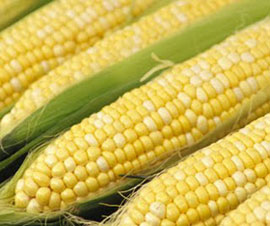Vietnam will have high-yielding genetically modified food
Around 2015, genetically modified corn, soy . products with higher yields will be grown massively and then appear in supermarkets, markets and meals of every Vietnamese family.
Mr. Duong Hoa Xo, Director of Ho Chi Minh City Biotechnology Center, said that according to the plan of the Ministry of Agriculture and Rural Development, in 2010, Vietnam will test and grow modified agricultural products. genes in the field. " By 2015, about 3-4% of new crops will be sourced from genetically modified foods that are put into production ," Mr. Xo said.
Speaking at a seminar on " Biotechnology - the direction for the future " taking place on September 21 in Ho Chi Minh City, Mr. Xo said that with a country where agriculture accounts for 35-40% of GDP and 75% of the population As agricultural workers like Vietnam, the application of biotechnology and genetically modified food is very important.

Genetically modified corn gives higher yields.(Artwork: Blogspot)
In fact, bringing genetically modified food to life is a new problem in the world.'The world is facing the challenge of providing enough food for 973 million hungry people today. In 2050, the world must double food production for 9 billion people , 'said Professor Paul S. Teng, Nanyang Technological University, Singapore.
According to Paul S. Teng, it is an urgent need for food that forces people to consider introducing genetically modified products for higher productivity. Mr. Ho Cao Viet, Vietnam Agricultural Science and Technology Institute, said that if the application of genetic modification to corn plants, Vietnam could have an additional VND 9,100 billion due to a 10% increase in productivity and a reduction in total costs. Use pesticides in the field.
By December 2008, there were 61 countries that approved 677 genetically modified products and appeared on the market, of which about 40% of genetically modified products were approved from Asia. Over 25 countries grow more than 125 million hectares of genetically modified food.
The effect is undisputed, however, according to scientists, the problem lies in the labeling process so that consumers recognize whether the product is genetically modified. Labeling is to provide consumers with information and choices rather than proof of food safety.
' Genetically modified food safety has been rigorously tested by governments before being marketed, so identification labeling is only a factor that provides information to consumers. Like the Philippines, after three years of testing, the president approved the commercial cultivation of genetically modified corn, but with very small corn characteristics, they could not regulate labeling , 'said Paul S. Teng.
Currently, in 61 countries that use genetically modified products, only 40 countries label their products with labels, some developing countries have labeling laws, but very few countries enforce them effectively.
Agreeing with the above point of view, Ms. Tran Thi My Hien, Deputy Director of the Center for Technical Standards, Quality Measurement 3, for example: in Vietnam, since 2005, there has been regulation on goods of genetically modified must specify ' product that uses transgenic technology '.
Scientific experts commented, labeling is necessary but requires a high cost and requires a good social infrastructure to effectively implement. Mandatory labeling can increase production costs by 11-12% and product prices by 10%. This will reduce sales because consumers are afraid of high costs of genetically modified products.
The draft Government Decree on biosafety for genetically modified foods clearly states that the threshold must be labeled as 5% (ie in a product with 5% genetically modified material).
- Genetically modified food in Vietnam ever since?
- Genetically modified plants and the future in Vietnam
- DNA from genetically modified food goes straight into the human body
- Things you should know about GMO genetically modified foods
- How to identify GMO genetically modified foods
- Genetically modified salmon in the US is controversial
- Manipulating food security?
- Genetically modified plants still cause doubts
- Using genetically modified foods is prone to cancer
- Legislation of genetically modified corn harmful
- Recognizing 4 genetically modified corn varieties for food
- Countering genetically modified corn causes cancer in mice
 Why do potatoes have eyes?
Why do potatoes have eyes? 'Tragedy' the world's largest carnivorous life: Death becomes ... public toilet
'Tragedy' the world's largest carnivorous life: Death becomes ... public toilet Tomatoes were once considered 'poisonous' for 200 years
Tomatoes were once considered 'poisonous' for 200 years Detecting microscopic parasites on human face
Detecting microscopic parasites on human face